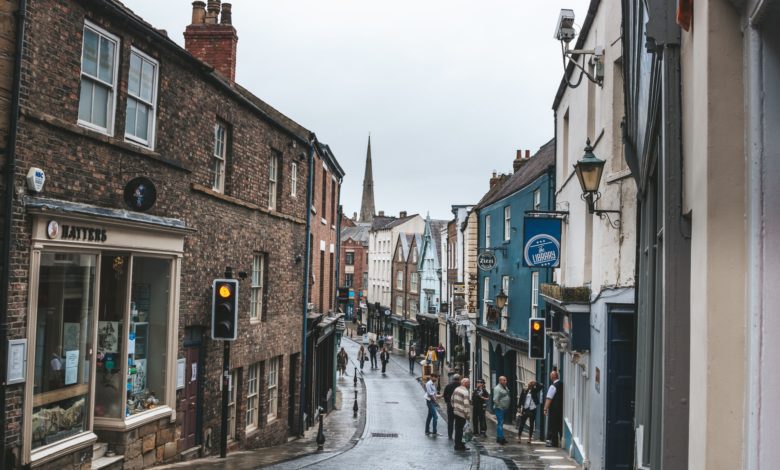Covid has hit communities hard, now social enterprise is striking back

The pandemic has undeniably battered our economy and turned neighbourhoods into semi-permanent ghost towns, threatening the very fabric of our communities.
As 2021 beckons, we just don’t know what our high streets and village centres will look like when businesses, shops, and pubs finally re-open – if they will ever re-open at all – and some form of normality resumes. In recent months, there has been a rising trend in social capitalism which has seen local people come together to get involved in community enterprise schemes and projects. What’s more, with the last quarter’s figures revealing a 4.5% unemployment rate and record redundancies, this could spell opportunity, as a means of instilling purpose, utilising skills and restoring the lifeblood to lost communities.
In neighbourhoods across the country there are buildings and amenities that are integral to the communities that use them. This could be a village shop, a pub, a community centre, or a library, for example. Many provide a base from which to deliver public services to the local community. The closure or sale of such buildings and amenities can create lasting damage in communities and threaten the provision of services.
Perhaps this is something your clients are considering or maybe you will be approached for advice in the near future, as the uncertain climate could trigger more opportunity in this area, so here are the answers to some key questions you might be asked:
What does community ownership actually mean?
In short, it is a rewarding way of giving people control over the buildings and spaces that have significance to them while ensuring they are used in ways that meet the priorities and needs of the local community.
What are the key characteristics of a social enterprise?
As a minimum a social enterprise, which encompasses everything from charities to community interest companies, must a) have a social purpose that impacts on strategic planning, objectives and goals; b) undertake a business (trading) activity which, in most years, should account for 50% or more of total income; c) reinvest a minimum of 50% of profits in furtherance of its social purpose and d) have restrictions on property rights built in to its governing document.
What are the key questions to address to determine what legal entity we as a community organisation want to be?
The following questions will need to be considered to help such organisations plan:
- Who is going to ‘own’ and manage your organisation?
- How do you plan to fund your organisation?
- What is your business model?
- What will you do with any profit you make?
- Who is going to benefit from your activities?
- Do you need charitable status?
- Do you plan to own a building or land?
- Do you plan to take out a loan or a mortgage?
- Do you want to raise money through donations and fundraising?
- Or do you want to sell shares in your business?
- Do any members or directors want to be paid?
- Do you want a democratic, co-operative structure or something more hierarchical?
- Do you want a large membership which has a say in the running of the organisation or do you want to restrict control and ownership to just a small number of people?
- What is the level of risks to a member of the Board and how much protection do they need as individuals?
What is an asset of community value (ACV)?
An ACV offers greater opportunity for communities to keep such buildings in public use and ensure they remain a social hub for the community. It is defined as a building or other land if its main use has recently been or is presently used to further the social wellbeing or social interests of the local community and could do so in the future. The Localism Act states that ‘social interests’ include cultural, recreational and sporting interests, such as for example:
- Cultural or sporting or recreational spaces – sports and leisure centres, swimming pools/lidos, libraries, theatres, museums
- Community spaces – community centres, community offices, resource centres, village halls, faith buildings
- Woodlands, parks, and open green spaces
- Any economic use which also provides an important local social benefit – in these cases, it is the social value of the business that counts, not just the nature of the business – this could include village shops, coffee shops, pubs and markets
How does a building or land become an ACV?
Community organisations can nominate an asset to be included on their local authority’s register of asset of community value. If the land or buildings meet the definition of an ACV, and the nomination process was undertaken correctly (i.e. came from a group entitled to nominate), then the local authority must consider the application in full and decide whether to include the asset on its list.
What happens then?
Once listed, the local community will be informed if the owner of an ACV wishes to sell the asset, where it is then listed for sale or lease within the five-year listing period. The community can then enact the community right to bid, which gives them a moratorium period of six months to determine if they can raise the finance to purchase the asset. During this time, the owner cannot proceed to sell or lease the asset.
The second phase is the full moratorium period, which is another six months, during which a community organisation can develop a proposal and raise the money required to bid to buy the asset.
Are there any circumstances where the moratorium will not be applied, even when it is an ACV on the list?
Yes, the regulations list the following situations which include:
- If the disposal is a gift
- If the disposal is made between members of the same family
- If the land or building being disposed of is part of a bigger estate
- If the disposal is of a building or piece of land on which going-concern business is operating, provided that the sale is to a new owner to continue the same business (for example if an owner of a pub wants to sell the pub to a new owner, to continue running it as a pub).
Considering a social enterprise is on the rise and it may be a service which you can offer to support your local community. For more information, please visit the UK government website, the My Community website, or the Social Enterprise website.
This article has been provided by The Institute of Financial Accountants. More information can be found at www.ifa.org.uk









